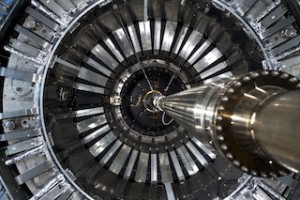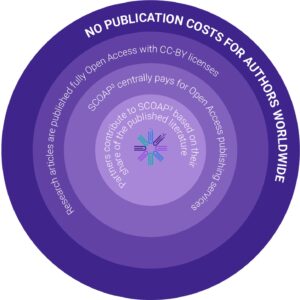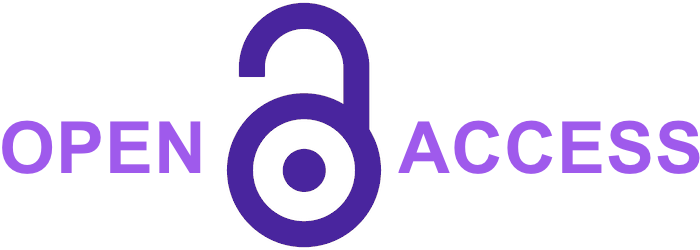
What is SCOAP3?

Picture © 2014 by CERN CC-BY-SA 4.0
SCOAP3 is a one-of-its-kind partnership of over three thousand libraries, key funding agencies and research centers in 44 countries, regions or territories and three intergovernmental organisations. Working with leading publishers, SCOAP3 has converted key journals in the field of High-Energy Physics to Open Access and continues to support OA publishing in these journals at no cost for authors. In addition, existing Open Access journals and even books and monographs are centrally supported, removing existing financial barrier for authors and allowing a free and easy scientific discourse in High-Energy Physics. Each country, region or territory contributes in a way commensurate to its scientific output in the field.
SCOAP3 journals are open for any scientist to publish in without any financial barriers. Copyright stays with authors, and a permissive CC-BY license allows text- and data-mining. SCOAP3 addresses Open Access mandates at no burden for authors. All articles appear in the SCOAP3 repository for further distribution, as well as being Open Access on publishers’ websites. Metadata are freely available and an API (SCOAP3 partner exclusive) allows easy ingestion of all articles in national or institutional repositories.
How does it work?
The SCOAP3 model is based on a lightweight central administration at CERN which arranges payment of Article Processing Charges at a competitive level, through funds made available by the participating institutions.
The total amount contributed by each country, region or territory is commensurate with its share in the worldwide scientific output in High-Energy Physics. To fairly reflect the global diversity in the context of large scientific collaborations, typical for the discipline, each article is allocated proportionally based on the institutional affiliation of all its authors. This correctly reflects the international collaborative nature of High-Energy Physics and allows a fair distribution of publication costs across all participating institutions.
Based on the central support of OA publishing in the participating journals, all authors worldwide can publish their works in Open Access without any financial or administrative barriers.
SCOAP3 Executive Committee
The Executive Committee oversees the day-to-day operation of the partnership. Supported by both the SCOAP3 Operations Manager and several Community Working Groups, the Executive Committee ensures a smooth operation and manages relations with partners and participating publishers. The Executive Committee comprises 4 to 6 members appointed by the Governing Council as well as one representative of CERN as the Host Organisation. The Committee meets at least once a month and reports to the Governing Council.
Show the current Executive Committee members- Jiří Jirát (Czech Republic)
- Judith Ludwig (Germany)
- Mehmet Mirat Satoglu (Türkiye)
- Mary Schlembach (United States)
- Anna Vernon (UK)
-
Xin Li (China)
CERN in its role as the Host Organization of SCOAP3 appoints Alexander Kohls as an additional member of the Executive Committee succeeding Salvatore Mele who pioneered SCOAP3.
Stefan Hohenegger (France) as the Chair of the Governing Council as well as Kamran Naim as the SCOAP3 Operations Manager attend the meetings as observers.Community Working Groups
The Governing Council decides about the creation of working groups and appoints the working group members.
Show the current Working Group membersCurrently, the SCOAP3 governance includes the following working groups:
Audit Committee – selects the external auditor, defines the audit mandate and reviews the audit report.
Members: Natalia Grygierczyk (NL, chair), Ann Okerson (US), Kerstin Stieg (AT).
Communications and Outreach Working Group – provides advice on outreach and marketing material and the communication strategy.
Members: Nina Karlstrøm (NO, chair), Carol Hoover (US), Carolyn Alderson (UK), Alexander Kohls (CERN), Jens Vigen (CERN), Paola Gargiulo (IT).
Open Books Working Group – develops and executes a strategy to transform key text books and monographs in particle physics to Open Access, using the collaborative power of the SCOAP3 partnership.
Members: Tullio Basaglia (CERN), Celeste Feather (USA), Stefan Hohenegger (France), Nina Karlstrom (Norway), Alexander Kohls (CERN), Caroline Mackay (UK), Matthew Marsteller (USA).
Repository Strategy and Support Working Group – supports the SCOAP3 Repository Manager on strategic and technical aspects of the development of the SCOAP3 Repository and its interfaces. Members: Florian Schwennsen (DE), Jean-Blaise Claivaz (CH), Alexander Kohls (CERN), João Moreira (PT).
SCOAP3 Tender Working Group – develops a strategy for the procurement process and business model of the upcoming contract cycle of SCOAP3.
Members: Adam Der (Germany), Kerstin Grossmaier-Stieg (Austria), Carol Hoover (USA), Youngim Jung (South-Korea), Salvatore Mele (CERN) and Ann Okerson (USA) in addition to the SCOAP3 Executive Committee members and the chair of the Governing Council.
SCOAP3 Governing Council
The SCOAP3 Governing Council is the decision-making body of the partnership responsible for its overall governance and strategic direction. The Governing Council is composed of representatives from countries that contribute to SCOAP3. The Governing Council appoints the Executive Committee and the Working Groups and meets at least once a year. The Governing Council is currently chaired by Stefan Hohenegger who took over from previous chair Clare Appavoo who succeeded Ivy Anderson and Ralf Schimmer.
Show reports of previous meetings- Governing Council meeting at CERN on December 4th 2013
- Governing Council meeting at CERN on May 26th 2014
- Governing Council meeting at CERN on December 17th 2014
- Governing Council meeting at CERN on June 15/16th 2015
- Governing Council meeting at CERN on December 11th 2015
- Governing Council meeting (remote) on March 18th 2016
- Governing Council meeting at CERN on March 23-24th 2017
- Governing Council meeting at CERN on May 3-4th 2018
- Governing Council meeting at CERN on October 29-30th 2019
- Governing Council meeting (remote) on October 20-21st 2020
- Governing Council meeting (remote) on November 03-04th 2021
- Governing Council meeting (hybrid) on November 09-10th 2022
- Governing Council meeting (hybrid) on December 06-07th 2023
- Governing Council meeting (hybrid) on October 23-24th 2025

